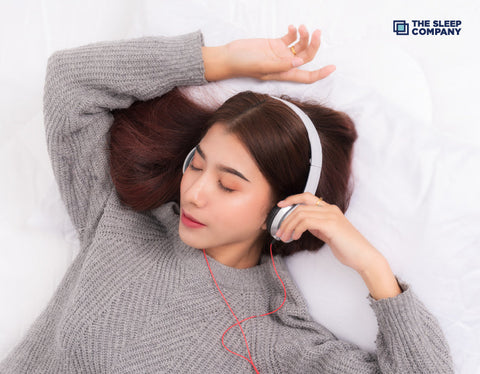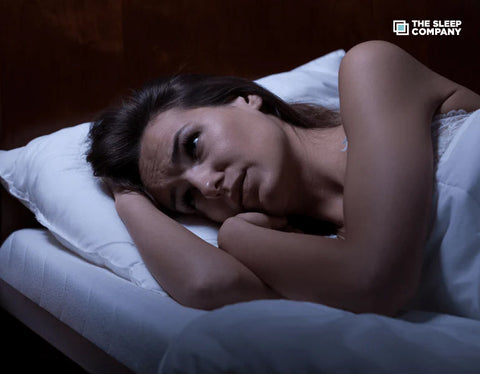My Cart

A Lack Of Sleep Affects You More Than You Know:

Do you spend your nights tossing, turning, counting sheep and trying to find a comfortable position to help you drift off to sleep? A lack of sleep even for one day will leave you feeling groggy, cranky and tired the next day. This lack of sleep, also known as sleep deprivation, happens to the best of us; it might start with harmless doom scrolling every night, catching up on your favourite shows, working long hours or even your everyday lifestyle habits. Adding fuel to the fire is the hustle culture, which constantly propels us to work harder, for longer hours, pushing us to be engaged, connected, and available at all times, thus depriving us of needed rest.
A lack of sleep is a global issue, and India ranks second on the list of the most sleep-deprived countries. This worrisome statistic denotes a deep-rooted issue we need to address promptly. In a culture that glorifies the hustle work ethic, sleep might feel like a luxury reserved for only a few. But it is a biological need which will recalibrate your body, improve your mood, boost your health and help you feel more energised throughout the day. A lack of rest will harm us not only in the short term but also in the long run.
Heres What Happens To Your Body While Sleeping:
To help you understand how a lack of sleep effects your body. You need to understand what happens to your body while sleeping. On average, your body needs at least 7 to 9 hours of sleep every night to rest, calibrate and regenerate itself to carry out your bodily processes effortlessly. To help you understand how a lack of rest will affect your body, you need to know the stages of sleep your body goes through every night:
Stage 1:
- Light Sleep: Your body enters this stage when it is just drifting off to sleep. This accounts for just 5% of your total sleep.
Stage 2:
- Deeper Sleep: This deep sleep stage accounts for 45% of your sleep time, and it keeps increasing as you age. According to research, a deep sleep stage is essential in memory storage and learning.
Stage 3:
- Deepest Sleep:This stage accounts for at least 25% of the time you will spend sleeping. This sleep stage is crucial in maintenance and recovery, because the brain prioritises this stage for those suffering from sleep deprivation.
- REM Sleep:The full form of REM stands for “rapid eye movement”. During this stage, you will experience dreams. Additionally, this sleep stage is crucial in performing multiple functions like brain development and processing emotions. If you look closely, some individuals might experience eye movements beneath their eyelids.
As you fall asleep, your body enters stage 1 and then transitions between stages 2 and 3. Post which you will fall into REM sleep and subsequently a dream state of mind. After the first REM cycle, you might start a new sleep cycle and go back into stage 1 or 2. A single cycle lasts for around 90 to 120 minutes before another one begins. On average, people go through around four to five cycles per night.
Lack Of Sleep Effects On Your Body:

A lack of rest negatively affects your body in many ways; lack of sleep effects include groginess, loss of focus, irritation, moodiness and tiredness. In the long term, lack of sleep effects include a higher risk of developing heart diseases, high blood pressure, weakened immunity, hormonal imbalances and chances of developing depression and anxiety.
- Heart Health: A lack of sleep will affect your heart and circulatory health in the long run. An individual suffering from chronic sleep deprivation is prone to hypertension (high blood pressure and high cholesterol levels.
- Diabetes: People suffering from chronic lack of sleep are more likely to develop type 2 diabetes.
- Immunity: If you dont get enough sleep, your body's natural defences against infections might not work effectively, thus compromising your immune system.
- Brain Health: A lack of sleep has a negative impact on your brain function, and it might affect your memory, learning abilities, and it might even lead to issues like Alzheimers disease.
- Mental Health: A lack of rest will affect your mental health, making it difficult to manage your emotions, leading to a higher likelihood of developing stress and anxiety.
Health Issues That Can Worsen Due To Sleep Deficiency:

A lack of sleep might wreck your health under certain conditions. If you already have these conditions, your lack of rest might just make them worse:
- Type 2 Diabetes
- High Blood Pressure (Hypertension)
- Sleep Apnea
- Vascular disease
- Stroke
- Heart Attack
- Depression
- Anxiety
In this piece, we aim to help you understand the consequences of the lack of sleep effects on your health, and a few steps you can take to tackle this issue once and for all:
Sleep According To Your Age:
To tackle sleep deprivation, you need to know how much sleep your body requires according to your age. Sleep deprivation occurs when you dont get the required amount of sleep your body needs at night. Whether it happens for one night or over many months, it can still be classified as sleep deprivation. The first step you can take to tackle a lack of rest is to know how much sleep you require according to your age. Read the table below to find out how much sleep you need according to your age:
|
Age Group |
Sleep Needed |
|
Newborn Babies (3-month-olds) |
14 - 17 hours |
|
Infants (4 to 12 months old) |
12 - 16 hours |
|
Preschoolers (1 to 5 years old) |
10 - 14 hours |
|
School Children (6 to 12 years old) |
9 - 12 hours |
|
Teens (13 to 18 years old) |
8 - 10 hours |
|
Adults (18 years and up) |
7-9 hours |
If you dont get enough shut-eye according to your age group, it's never too late to make changes in your life. Weve listed out some ways you can improve your sleep cycle to ensure youre well-rested.
Figure Out The Reasons Why You Are Sleep Deprived:
Experiencing a lack of rest is as common as catching a cold. Everyone has experienced a lack of sleep at least once in their lifetime. Here are a few reasons why you might experience a lack of rest:
- Doomscrolling or binge-watching your favourite shows late into the night
- Working night shifts or hectic work timings
- Sleeping in a different place from home
- Insomnia and suffering from illnesses like coughs and colds
- Stress, anxieties, ruminating and overthinking
- Dementia, Alzheimer's or Parkinsons disease
If you have any of the above conditions, a lack of rest will further damage your health. So, if you are suffering from a lack of rest and find it difficult to drift off, consult your doctor and get some remedies to help alleviate sleep deprivation.
Lack Of Sleep Effects:
Just one night of lack of rest is enough to make you feel the effects of sleep deprivation. The first sign of lack of sleep is groginess, yawning, lethargy and constantly feeling negative all through the day. Additionally, your lack of rest might put you in a bad mood, making you feel more irritated, depressed or anxious. A study done by the American Psychological Association found a direct link between lack of rest and participants experiencing a higher risk of depression and anxiety. A lack of sleep effects people across the world, especially those who work night shifts. This includes first responders, pilots, doctors, truck drivers, watchmen and even cab drivers.
Some Ways To Combat Lack Of Rest:

Here are some ways to help improve your sleep cycle through lifestyle changes and help you combat a lack of rest:
- Set A Sleep Schedule: Follow a strict sleep schedule by sleeping and waking up at the same time every day, especially on weekends.
- Create A Relaxing Environment: Amp up your bedroom with soothing decor, like dim lighting, cosy essentials like fitted sheets, mattress protectors and even comforters to keep you comfortable all through the night.
- Limit Your Screen Time Before Sleeping: Half an hour to one hour before bedtime, you must avoid using your devices, because the blue light emitted by these devices will affect your melatonin production and delay your sleep cycle.
- Avoid Caffeine and Alcohol: Avoid consuming caffeine or alcohol, especially in the evening, as this can affect your sleep.
- Exercise Before Bed: Practice light exercises just before bed, as this can help you sleep better.
- Stress Management: Relax your mind before sleeping. You can do this by practising mindfulness and yoga to help you unwind and soothe your body into a restful state of mind.
- Invest in our SensAI products: The best way to tackle your lack of sleep is to know all about your sleep cycle by investing in tech products which will track your sleep metrics all through the night.
- SensAI Sleep Analyser:This ultra-thin, sound-proof and touch-free device can be placed under your pillow to track your sleep cycle efficiently. You can even explore our other SensAI products, like our SensAI sleep analyser pillow and mattress.
- SensAI Sleep Analyser Pillow: This pillow is designed with our patented SmartGRID Technology, which offers optimal support to your head and neck. It even measures your breathing rate, heart rate and delivers a personalised sleep score to you every morning.
- SensAI Mattress: This mattress will redefine comfort like never before. It is luxuriously designed with independent recline features, adjustable firmness and even an in-built alarm. Equipped with different modes like anti-snore mode, cradle mode and sleep-aid mode, the SensAI mattress offers a calming massage simulation in the sleep-aid mode to help you drift off to sleep. In the cradle mode, the mattress delivers therapeutic sensations to your lumbar region, while the anti-snore mode is equipped with a smart snore detection feature, which automatically elevates your head if you snore at night.
It's imperative to get enough sleep daily to improve your health and ensure you feel well-rested. A lack of rest will drain your body and affect your health in the long run. You might experience lethargy, cognitive issues, heart issues, high blood pressure, irritation, tiredness and moodiness. If youve been suffering from sleep deprivation for a long time, it's never too late; you can always make changes to your lifestyle and improve your sleep cycle and your health subsequently.





























































